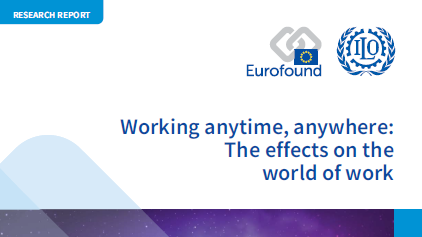
Press release -
‘Working anytime, anywhere: The effects on the world of work’ - new report highlights opportunities and challenges of expanding telework
GENEVA/BRUSSELS (ILO News) –The expanding use of digital technologies such as smartphones, tablets, laptops and desktop computers for work for home and elsewhere is rapidly transforming the traditional model of work. It can improve work-life balance, reduce commuting time, and boost productivity, but it can also potentially result in longer working hours, higher work intensity and work-home interference, according to a new joint ILO-Eurofound report released today.
The new report Working anytime, anywhere: The effects on the world of work synthesises research carried out by both organisations in 15 countries, including ten EU Member States[1] as well as Argentina, Brazil, India, Japan and the United States. The study identifies several types of employees using new technologies to work outside the employer’s premises, including regular home-based teleworkers, workers performing occasional telework and ICT-mobile work (T/ICTM).[2]
The report highlights a number of positive effects of T/ICTM work, such as greater working time autonomy leading to more flexibility in terms of working time organisation, and reduced commuting time resulting in a better overall work-life balance and higher productivity. It also identifies several disadvantages such as a tendency to work longer hours, and an overlap between paid work and personal life – which can lead to high levels of stress. The report draws clear distinctions between home-based teleworkers who seem to enjoy better work-life balance and ‘high-mobile’ workers who are more at risk of negative health and well-being outcomes.
‘This report shows that the use of modern communication technologies facilitates a better overall work-life balance but, at the same time, also blurs the boundaries between work and personal life, depending on the place of work and the characteristics of different occupations,’ said the ILO’s Jon Messenger, co-author of the report.
The report provides recommendations in order to address this disparity, such as promoting formal part-time teleworking to help teleworkers maintain ties with their co-workers and improve worker well-being, while restricting informal and supplemental T/ICTM work involving long working hours.
‘It is particularly important to address the issue of supplemental work performed through modern communications technology, for example additional working from home, which could be viewed as unpaid overtime, and also to ensure that minimum rest periods are respected, in order to avoid negative effects on workers’ health and well-being,’ said Oscar Vargas from Eurofound.
Currently only the EU has an overall framework to adapt to digital change on telework, with the European Framework Agreement on Telework. However, most existing initiatives are related to formal, home-based telework, while problems seem to be more recurrent with informal, occasional T/ICTM work.
As telework becomes more prominent so too has the need to disconnect in order to separate paid work and personal life, with France and Germany beginning to look at arrangements at the company level, and at existing and new legislation. In the future this may result in concrete measures to make working life less pervasive, such as shutting down computer servers outside working hours in order to prevent emails during rest times and holidays, which is already happening in some companies.
[1]Belgium, France, Finland, Germany, Hungary, Italy, the Netherlands, Spain, Sweden, and the United Kingdom
[2]The incidence of T/ICTM varies substantially, ranging from 2 per cent to 40 per cent of employees, and depending on the country, occupation, sector and the frequency with which employees engage in the type of work. Across the EU-28, an average of about 17 per cent of employees are engaged in T/ICTM. In most countries, larger proportions of workers carry out T/ICTM occasionally rather than on a regular basis.
Related links
Topics
ABOUT EUROFOUND
For more information about Eurofound and its work, and free access to all our data and findings, visit our website and follow us on these social media channels: Twitter, LinkedIn, and Facebook.
For upcoming publications and events please see our Corporate Calendar 2017.
ABOUT THE INTERNATIONAL LABOUR ORGANISATION (ILO)
The only tripartite U.N. agency, since 1919 the ILO brings together governments, employers and workers representatives of 187 member States, to set labour standards, develop policies and devise programmes promoting decent work for all women and men.
Click here for more news and information from the ILO


